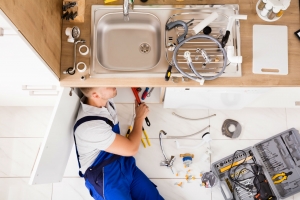 Drain clogs are one of the many joys of indoor plumbing, and more often than not, they are easily fixable. If you experience a drain clog, try these troubleshooting tips before calling in a professional.
Drain clogs are one of the many joys of indoor plumbing, and more often than not, they are easily fixable. If you experience a drain clog, try these troubleshooting tips before calling in a professional.
BATHROOM DRAINS
Bathroom sink, shower, and toilet drains can get clogged by a number of items – skin flakes, dirt, makeup and hair binding to the soap scum that is lining the drain.
Troubleshooting: There are a few different ways to easily fix a clogged bathroom drain, but you should always start by removing the drain stopped. Once removed, clean any debris off of it. If this does not fix the situation, try using a drain plunger and be sure to block the overflow drain when doing so. The last line of defense would be to remove the elbow joint of the drain and clean the drain that way.
CLOGGED TOILETS
Toilets get clogged when items that aren’t supposed to be flushed, are flushed. Some common items are feminine hygiene products, cotton swabs, dental floss, and pre-moistened baby wipes. These items are un-dissolvable or do not break apart in water.
Troubleshooting: The first line of defense with a clogged toilet should always be a toilet plunger. The plunger will shoot water through the drain to help relieve the issue by pushing the object through the pipes. If this doesn’t work, a plumbing snake can be used. These snakes can reach anywhere between two and five feet though the pipes and grab whatever is stuck so you can pull it out. Although not a pleasant experience, this should resolve the issue.
The best way to keep your toilet free of clogs is to only flush waste and paper that is dissolvable in water.
KITCHEN SINK CLOGS
Kitchen sinks can clog when cooking grease or oil are poured down the sink and stick to the walls of the drain pipes. Overtime, when food and soap go down the drain, they get stuck in the grease build up and start blocking of the entirety of the drain.
Troubleshooting: Kitchen sink clogs should be tackled like you would a tackle a bathroom sink clog. Start off by running hot water down the sink, adding a dollop of dish soap, and continuing to run hot water down the sink. This will help soften up the clog, making it easier to unclog with a plunger or drain snake. Chemical drain cleaners can also be used if this doesn’t work.
To help prevent sink clogs in the future, avoid pouring cooking crease and oils down the drain. Let them solidify in a container and throw them away in the trash. If you do have to pour small amounts of grease down the drain, be sure to run hot water and soap down the sink after doing so.
If you are experiencing any plumbing issues, give us a call at (603) 518-5777 to set up an appointment to get the situation resolved as soon as possible!